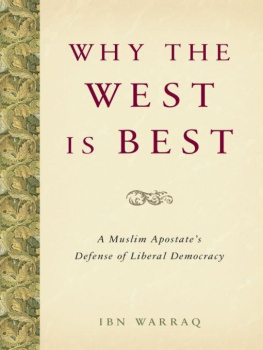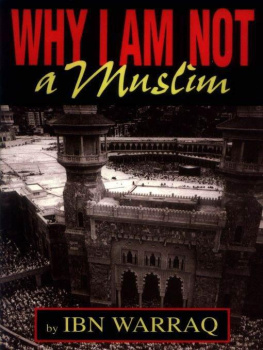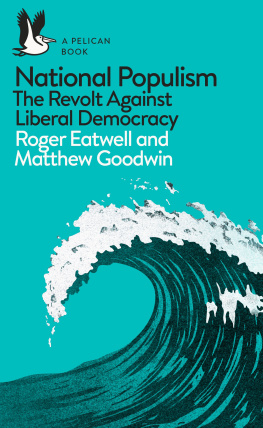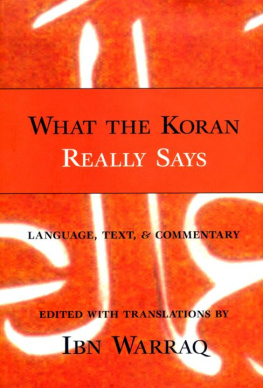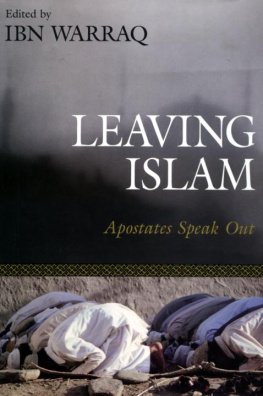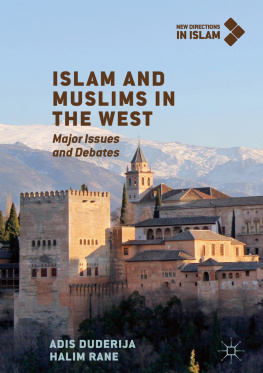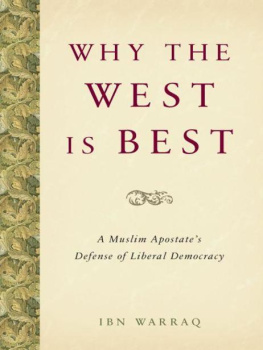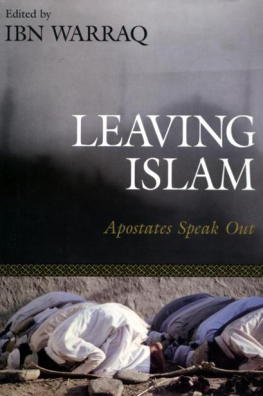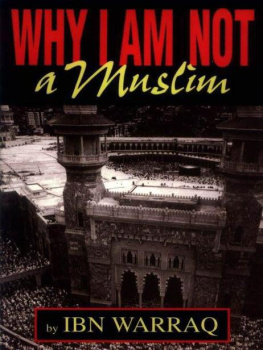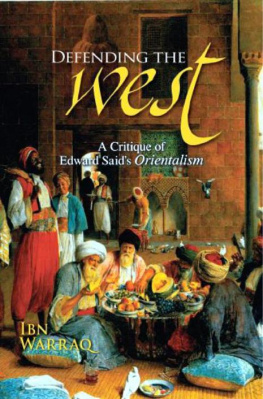Table of Contents
PRAISE FOR WHY THE WEST IS BEST
In his new book, Ibn Warraq continues his courageous and brilliantly written evaluation of contemporary societies. He provides an eloquent, fervent, and much-needed advocacy of Western principles and values, which he considers superior to those in any other societies, and challenges Western intellectuals who are unprepared or unwilling to defend those values.
MICHAEL CURTIS, DISTINGUISHED PROFESSOR
EMERITUS OF POLITICAL SCIENCE, RUTGERS UNIVERSITY
A brilliant, uncompromising, and exceedingly powerful defense of the Wests civilizational heritage by one of the bravest and most original public intellectuals writing today.
EFRAIM KARSH, DIRECTOR, MIDDLE EAST FORUM
for Deborah
ACANTHUS (Greek: , derived from ake , point, thorn) is a genus of about thirty species of flowering plants of the Acanthaceae family, found in temperate and tropical climates of the Mediterranean basin and Asia. It has been used as a decorative motif throughout the history of Western art: on Corinthian capitals of ancient Greek and Roman columns, in the ornate decorations of Byzantine architecture, on Romanesque buildings, in sculpted wood and stone of the Middle Ages, in the borders and ornamented initials of illuminated manuscripts, on sumptuous fabrics, in baroque and rococo styles, in Nordic woodcarving and painting, on Italian ceramics, in the designs of William Morris. The acanthus has graced almost every form of visual art across millennia, from the Mediterranean to Scandinavia. Given this ubiquity and the centrality of our classical heritage, the acanthus is a fitting symbol of Western civilization. Acanthus wallpaper, designed by William Morris, 1875. (The Stapleton Collection/Art Resource, NY)

Limbourg brothers (fl. 13991416), detail from the Trs Riches Heures du Duc de Berry . (Runion des Muses Nationaux/Art Resource, NY)
Acanthus-trimmed capitals on the cathedral in Syracuse, Italy, by Andrea Palma, completed in 1753. (Photo Giovanni DallOrto, WikiCommons)
PREFACE
A story about Mahatma Gandhi has been circulating for years. After being given a tour of Great Britain, he was asked in Parliament what he thought of British civilization. Gandhis answer: that it might be a good idea. The story is hard to trace to its source and may be apocryphal. Even so, that replyrevealing little wit and even less wisdomaptly sums up Gandhis ingratitude, hypocrisy, arrogance, and incomprehension.
Gandhis philosophy of nonviolence was effective with the British precisely because they were not inclined to use excessive force against unarmed civilians. Instead, they behaved in a civilized manner, and they left. Would Gandhis tactics have worked with the Nazis? Moreover, the British departure from India was followed by violence, as Muslims slaughtered Hindus and vice versa. Nirad Chaudhuri, an Indian intellectual, always blamed Gandhi. To me all these demands of Mahatma Gandhi [on the British government] seemed not only extreme, but even crude and irrational, Chaudhuri wrote. It appeared to me that his entire ideology was driven by a resolve to abandon civilized life and revert to a primitive existence.
What of your own Indian civilization, Mr. Gandhi? The British banned one manifestation of it, the custom of suttee, where a widowed Hindu woman was forced to immolate herself on her husbands funeral pyre. The Portuguese and later the French and the Dutch also banned the practice in their own Indian colonies. Another shameful expression of Indian civilization, the iniquitous caste system, remains in force even today, depriving millions of their human rights, even after sixty-five years of de jure prohibition.
What of your own racism, Mr. Gandhi? In a well-documented critique, G. B. Singh points out that during the Zulu Wars in South Africa, the Mahatma was urging Indians to show patriotism by killing blacks. Gandhi is overly eager to see his Indians in a war against blacks, Singh writes. After all, he tells them rather frankly, they too are colonists over blacks and therefore, standing shoulder to shoulder with fellow white colonists is a natural progression.
And to what can we attribute the stark failures of India today? In 2007, the World Bank reported that 80 percent of Indias I.I billion people survived on less than two dollars a daywhich meant that more than one-third of the worlds poor lived in India. One could even suggest that Indian civilization might be a good idea.
Gandhis contemptuous dismissal of the British is refuted by the facts on both sidesof colonizer and colonized. On pulling up stakes, Britain left India with an elected parliamentary government that survives to this day, a sure indication that democracy was planted deeply in the political mind of India. The constitution formulated by Indians includes a bill of rights derived from the U.S. Constitution, even using some identical phrasingan indirect British legacy. The British bequest included the rule of law. In fact, the entire legal system they had introduced over the years was left unaltered. It was constructed by Lord Macaulay, whose genius gives life to modern India as we know it, according to the Indian historian K. M. Pannikar. India also inherited a British-style administrative machine, the incorruptible Indian Civil Service, to carry on the business of government in a vast country of disparate religions and languages.
The British left India with well-trained doctors, teachers, engineers, and craftsmen, and an infrastructure of railways, roads, bridges, and irrigation systems, along with distinguished Victorian architecture. The English language enables an Indian from the south whose native tongue is Tamil to communicate with someone from Delhi who speaks Hindi or Punjabi. A mastery of English is allowing India to take her place in the world economy today. There were also spiritual gifts: British and other European scholars gave back to India her own history and culture. With their insatiable intellectual curiosity, the British wrote about every aspect of life, literature, philosophy, religion, language, art and architecture in India. Their scholarship is still revered and taught to every Indian schoolchild. British civilization was, indeed, not only a great idea but a great blessing.
Much of what has been most valuable to the nations emerging from colonialism was bequeathed to them by the British and other European powers. Yet many Western academics, along with some Third World intellectuals, claim that the West has taken more from the world than it has contributed, and that its material success has come at the expense of others. Western leaders have been bullied into constantly apologizing for the Wests sins. It is considered Eurocentric or racist to assert that the West is superior to other cultures; instead, we are encouraged to repeat that Western civilization is culturally, intellectually, and spiritually defective. But we know this is nonsense.
This essay argues that Western civilization is good for the world. I will sketch out a moral ideal by drawing a particular set of values from the history of the Westvalues that are both explicit and implicit in Western liberal democracies, and enshrined in that magnificent document, the Constitution of the United States of America. We can trace these ideals back as far as the Bible and Greek antiquity. A fascist or a communist might also trace his own principles back through time to ancient Greece, perhaps to Sparta rather than Athens. My advocacy of a different branch of our Western heritage is neither arbitrary nor subjective, however. The political and social configurations of the West in the second decade of the twenty-first century indicate that we have reached a certain measure of agreement on the principles that resulted in the stability and prosperity we have enjoyed since the end of the Second World War.





